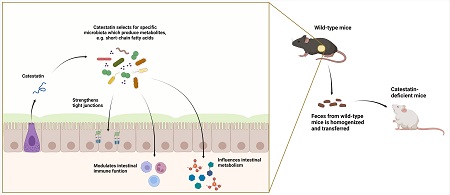Poeptransplantatie werpt licht op inflammatoire darmziekten
Bij inflammatoire darmziekten zijn verschillende veranderingen in de darmen zichtbaar, zoals een hogere doorlaatbaarheid van de darmwand, een verandering in de soortensamenstelling van de darmbacteriën en in de uitscheiding van antimicrobiële stoffen door darmcellen. Het is lastig om uit te zoeken welke verandering oorzaak of juist gevolg zijn van de ontsteking. Nu heeft RUG microbioloog Sahar El Aidy samen met collega’s uit San Diego (VS) uitgeplozen welke keten van gebeurtenissen de ontsteking veroorzaakt. De resultaten zijn op 29 mei gepubliceerd in het tijdschrift Gut Microbes.
De wetenschappers gebruikten hiervoor muizen waarbij een gen dat zorgt voor de aanmaak van de antimicrobiële stof catestatine is uitgeschakeld. In gewone muizen scheiden cellen aan de binnenkant van de darm dit catestatine uit. Onlangs beschreef hetzelfde team onder leiding van adjunct hoogleraar El Aidy hoe bij deze muizen de soortensamenstelling van micro-organismen in de darm was veranderd, en dat ze symptomen van een ontsteking in de darm hadden.

Stofwisselingsproducten
Voor de nieuwe experimenten gebruikten de onderzoekers een ‘poeptransplantatie’ om uit te zoeken of de verandering in soortensamenstelling de oorzaak was van de ontsteking, of een gevolg. Zij gaven muizen die geen catestatine meer maken en gewone muizen die dat wel doen een laxeermiddel, waardoor de meeste bacteriën uit de darmen verdwenen. ‘We gebruikten hiervoor geen antibiotica, omdat die de groei kunnen remmen van de nieuwe bacteriën uit de getransplanteerde ontlasting’, legt El Aidy uit.
De muizen zonder catestatine kregen ontlasting toegediend van gewone muizen, en omgekeerd. Twee weken later zijn monsters genomen om uit te zoeken welke soorten micro-organismen er in de darmen aanwezig waren. ‘De resultaten lieten dat de nieuwe soortensamenstelling leek op die van de donoren, wat betekent dat de transplantatie succesvol was verlopen.’ Een analyse van stofwisselingsproducten in de darm liet zien dat de productie van zogeheten korte-keten vetzuren, moleculen die de werking van de darmen kunnen beïnvloeden, was verlaagd in muizen zonder catestatine. ‘En dat werd grotendeels ongedaan gemaakt door de transplantatie met ontlasting van gewone muizen’, zegt El Aidy.
Bindweefselvorming
De afname in korte-keten vetzuren ontstond door een verandering in de soortensamenstelling van micro-organismen in de darm, die weer een gevolg was van de afwezigheid van catestatine. El Aidy: ‘Onze experimenten laten zien dat de doorlaatbaarheid van de binnenste cellaag van de darmen, die hoger is bij muizen zonder catestatine, normaliseert na de transplantatie. Bovendien werd de hoeveelheid bindweefselvorming door de ontsteking minder.’ De resultaten tonen aan dat veranderingen in de soortensamenstelling in de darmen, veroorzaakt door de afwezigheid van catestatine, de oorzaak is van de darmontsteking bij de genetisch aangepaste muizen.

Dit is een belangrijke stap in de zoektocht naar een behandeling van darmontstekingen, legt El Aidy uit: ‘Door activiteit van allerlei genen te meten hebben we een patroon ontdekt dat samenhangt met de afwezigheid van catestatine, en dat lijkt op wat we zien bij patiënten met inflammatoire darmziekten. We hebben dat patroon kunnen herleiden tot enkele specifieke soorten micro-organismen in de darmen. Die lijken dus een rol te spelen bij de veranderingen die de ontsteking veroorzaken.’
Doelwit
Het is overigens niet de bedoeling om patiënten te gaan behandelen met poeptransplantaties. ‘Die leveren bij mensen wisselende resultaten op’, zegt El Aidy. ‘Vermoedelijk omdat we niet precies weten hoe een gezonde soortensamenstelling eruit ziet bij mensen.’ De resultaten van het nieuwe onderzoek wijzen specifieke bacteriesoorten aan die door catestatine worden beïnvloed en als doelwit kunnen dienen voor een behandeling van darmontstekingen. ‘Die informatie ontbrak bij eerdere pogingen om te zorgen voor een gezonde soortensamenstelling in de darmen.’
Referentie: Pamela González-Dávila*, Markus Schwalbe*, Arpit Danewalia, René Wardenaar, Boushra Dalile, Kristin Verbeke, Sushil K Mahata & Sahar El Aidy: Gut microbiota transplantation drives the adoptive transfer of colonic genotype-phenotype characteristics between mice lacking catestatin and their wild type counterparts. Gut Microbe, online 29 May 2022
*droegen evenveel bij aan het onderzoek
Meer nieuws
-
17 februari 2026
De lange zoektocht naar nieuwe fysica
-
10 februari 2026
Waarom slechts een klein aantal planeten geschikt is voor leven

